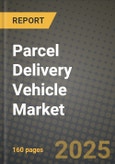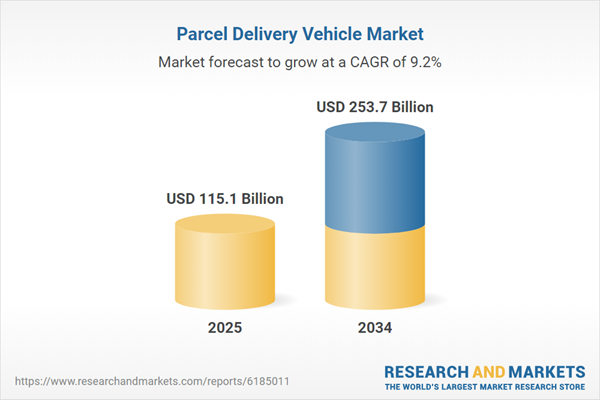The parcel delivery vehicle market is witnessing substantial growth, driven by the rapid expansion of e-commerce, increasing demand for last-mile delivery solutions, and advancements in logistics technology. With the surge in online shopping and same-day delivery expectations, logistics companies and retailers are investing in efficient, cost-effective, and sustainable delivery vehicles. The market includes a wide range of vehicle types, from light commercial vans and electric delivery trucks to autonomous last-mile delivery robots. The shift toward electrification and alternative fuel-powered vehicles is gaining momentum, as companies seek to reduce carbon emissions and operating costs. Additionally, governments worldwide are implementing stricter emissions regulations, further accelerating the transition from traditional internal combustion engine (ICE) vehicles to electric and hybrid delivery fleets.
The parcel delivery vehicle market experienced significant advancements in electric vehicle (EV) adoption, automation, and fleet optimization technologies. Major logistics players, including Amazon, FedEx, and UPS, expanded their investments in electric delivery vans, aiming to meet their sustainability commitments and reduce fuel costs. Autonomous delivery vehicles and drones saw increased pilot programs, particularly in urban and last-mile delivery operations. AI-powered fleet management systems were integrated into delivery operations, enabling route optimization, real-time tracking, and predictive maintenance. Additionally, the rise of gig economy and crowd-sourced delivery services led to the increased use of smaller, more agile delivery vehicles such as electric cargo bikes and compact urban delivery vans. Governments provided incentives and subsidies for electric delivery vehicles, further encouraging fleet operators to transition away from diesel-powered transport solutions.
The parcel delivery vehicle market is expected to witness further innovations in automation, sustainable logistics, and connected vehicle technology. The continued adoption of AI-driven fleet management solutions will optimize delivery routes, enhance fuel efficiency, and improve vehicle utilization rates. The development of next-generation electric delivery trucks with extended battery range and fast-charging capabilities will enhance operational efficiency for logistics providers. Additionally, the expansion of autonomous vehicle technology will lead to the deployment of self-driving delivery vans and robotic last-mile couriers. Hydrogen-powered delivery vehicles may emerge as a viable alternative for long-haul parcel transportation, offering zero-emission solutions with faster refueling times compared to battery-electric vehicles. As the industry moves toward a more sustainable future, collaborations between vehicle manufacturers, logistics companies, and technology firms will play a crucial role in shaping the next phase of the parcel delivery vehicle market.
Key Insights: Parcel Delivery Vehicle Market
- Expansion of Electric Delivery Fleets: Logistics companies are increasingly adopting electric vans and trucks to reduce emissions and comply with sustainability goals.
- Integration of AI and Fleet Management Technologies: AI-driven systems are optimizing delivery routes, improving fuel efficiency, and enabling predictive vehicle maintenance.
- Rise of Autonomous and Self-Driving Delivery Vehicles: Pilot programs for autonomous delivery vans and robotic couriers are expanding, particularly for last-mile logistics.
- Adoption of Compact and Micro-Mobility Delivery Vehicles: The rise of urban logistics is driving demand for electric cargo bikes and compact delivery vans for short-distance transportation.
- Growing Investment in Hydrogen-Powered Delivery Vehicles: Hydrogen fuel cell technology is gaining traction as a sustainable solution for long-haul parcel transportation.
- Rising Demand for Fast and Efficient Last-Mile Delivery: E-commerce growth is pushing logistics companies to optimize delivery speeds with advanced vehicle solutions.
- Stringent Emission Regulations and Sustainability Commitments: Governments and corporations are focusing on reducing carbon footprints through the adoption of electric and alternative fuel vehicles.
- Technological Advancements in Vehicle Automation and Connectivity: The integration of IoT, AI, and telematics is enhancing fleet efficiency, real-time tracking, and predictive maintenance.
- Increasing Urbanization and Need for Smart City Logistics: Compact and electric delivery vehicles are becoming essential for navigating congested urban areas and meeting sustainability targets.
- High Initial Investment and Charging Infrastructure Limitations: The transition to electric and autonomous delivery vehicles requires substantial upfront costs and expanded charging networks, posing a challenge for widespread adoption.
Parcel Delivery Vehicle Market Segmentation
By Type
- Class 2a
- Class 2b
- Class 3
- Class 4
By Vehicle Type
- Light Duty Vehicle
- Medium Duty Vehicle
- Heavy Duty Vehicle
By Gross Weight
- 3.5-5 Ton
- 6-7.5 Ton
- >8 Ton
By Operation
- Manual
- Autonomous
By End-Use
- Courier Companies
- Food Delivery Companies
- Fleet Management Companies
- Medical Courier Companies
- Warehouse Service Providers
- E-Commerce
Key Companies Analysed
- Toyota Motor Corporation
- Ashok Leyland
- Daimler AG
- Ford Motor Company
- General Motors
- Honda Motor Co. Ltd.
- Hyundai Motor Company
- Tesla Inc.
- Nissan Motor Co. Ltd.
- Kia Corporation
- Renault Group
- BYD Motors Inc.
- Isuzu Motors Limited
- Mitsubishi Motors Corporation
- Iveco Group
- Jeep
- Mahindra & Mahindra Ltd.
- MAN Truck & Bus AG
- Navistar International Corporation
- Peugeot S.A.
- Rivian Automotive Inc.
- Mack Trucks Inc.
- Kenworth Truck Company
- Freightliner Trucks
- Alkemy SpA
- London EV Company Limited
- StreetScooter Engineering GmbH
- FCA Group Marketing S.p.A.
Parcel Delivery Vehicle Market Analytics
The report employs rigorous tools, including Porter’s Five Forces, value chain mapping, and scenario-based modeling, to assess supply-demand dynamics. Cross-sector influences from parent, derived, and substitute markets are evaluated to identify risks and opportunities. Trade and pricing analytics provide an up-to-date view of international flows, including leading exporters, importers, and regional price trends.Macroeconomic indicators, policy frameworks such as carbon pricing and energy security strategies, and evolving consumer behavior are considered in forecasting scenarios. Recent deal flows, partnerships, and technology innovations are incorporated to assess their impact on future market performance.
Parcel Delivery Vehicle Market Competitive Intelligence
The competitive landscape is mapped through proprietary frameworks, profiling leading companies with details on business models, product portfolios, financial performance, and strategic initiatives. Key developments such as mergers & acquisitions, technology collaborations, investment inflows, and regional expansions are analyzed for their competitive impact. The report also identifies emerging players and innovative startups contributing to market disruption.Regional insights highlight the most promising investment destinations, regulatory landscapes, and evolving partnerships across energy and industrial corridors.
Countries Covered
- North America - Parcel Delivery Vehicle market data and outlook to 2034
- United States
- Canada
- Mexico
- Europe - Parcel Delivery Vehicle market data and outlook to 2034
- Germany
- United Kingdom
- France
- Italy
- Spain
- BeNeLux
- Russia
- Sweden
- Asia-Pacific - Parcel Delivery Vehicle market data and outlook to 2034
- China
- Japan
- India
- South Korea
- Australia
- Indonesia
- Malaysia
- Vietnam
- Middle East and Africa - Parcel Delivery Vehicle market data and outlook to 2034
- Saudi Arabia
- South Africa
- Iran
- UAE
- Egypt
- South and Central America - Parcel Delivery Vehicle market data and outlook to 2034
- Brazil
- Argentina
- Chile
- Peru
Research Methodology
This study combines primary inputs from industry experts across the Parcel Delivery Vehicle value chain with secondary data from associations, government publications, trade databases, and company disclosures. Proprietary modeling techniques, including data triangulation, statistical correlation, and scenario planning, are applied to deliver reliable market sizing and forecasting.Key Questions Addressed
- What is the current and forecast market size of the Parcel Delivery Vehicle industry at global, regional, and country levels?
- Which types, applications, and technologies present the highest growth potential?
- How are supply chains adapting to geopolitical and economic shocks?
- What role do policy frameworks, trade flows, and sustainability targets play in shaping demand?
- Who are the leading players, and how are their strategies evolving in the face of global uncertainty?
- Which regional “hotspots” and customer segments will outpace the market, and what go-to-market and partnership models best support entry and expansion?
- Where are the most investable opportunities - across technology roadmaps, sustainability-linked innovation, and M&A - and what is the best segment to invest over the next 3-5 years?
Your Key Takeaways from the Parcel Delivery Vehicle Market Report
- Global Parcel Delivery Vehicle market size and growth projections (CAGR), 2024-2034
- Impact of Russia-Ukraine, Israel-Palestine, and Hamas conflicts on Parcel Delivery Vehicle trade, costs, and supply chains
- Parcel Delivery Vehicle market size, share, and outlook across 5 regions and 27 countries, 2023-2034
- Parcel Delivery Vehicle market size, CAGR, and market share of key products, applications, and end-user verticals, 2023-2034
- Short- and long-term Parcel Delivery Vehicle market trends, drivers, restraints, and opportunities
- Porter’s Five Forces analysis, technological developments, and Parcel Delivery Vehicle supply chain analysis
- Parcel Delivery Vehicle trade analysis, Parcel Delivery Vehicle market price analysis, and Parcel Delivery Vehicle supply/demand dynamics
- Profiles of 5 leading companies - overview, key strategies, financials, and products
- Latest Parcel Delivery Vehicle market news and developments
Additional Support
With the purchase of this report, you will receive:- An updated PDF report and an MS Excel data workbook containing all market tables and figures for easy analysis.
- 7-day post-sale analyst support for clarifications and in-scope supplementary data, ensuring the deliverable aligns precisely with your requirements.
- Complimentary report update to incorporate the latest available data and the impact of recent market developments.
This product will be delivered within 1-3 business days.
Table of Contents
Companies Mentioned
- Toyota Motor Corporation
- Ashok Leyland
- Daimler AG
- Ford Motor Company
- General Motors
- Honda Motor Co. Ltd.
- Hyundai Motor Company
- Tesla Inc.
- Nissan Motor Co. Ltd.
- Kia Corporation
- Renault Group
- BYD Motors Inc.
- Isuzu Motors Limited
- Mitsubishi Motors Corporation
- Iveco Group
- Jeep
- Mahindra & Mahindra Ltd.
- MAN Truck & Bus AG
- Navistar International Corporation
- Peugeot S.A.
- Rivian Automotive Inc.
- Mack Trucks Inc.
- Kenworth Truck Company
- Freightliner Trucks
- Alkemy SpA
- London EV Company Limited
- StreetScooter Engineering GmbH
- FCA Group Marketing S.p.A.
Table Information
| Report Attribute | Details |
|---|---|
| No. of Pages | 160 |
| Published | October 2025 |
| Forecast Period | 2025 - 2034 |
| Estimated Market Value ( USD | $ 115.1 Billion |
| Forecasted Market Value ( USD | $ 253.7 Billion |
| Compound Annual Growth Rate | 9.1% |
| Regions Covered | Global |
| No. of Companies Mentioned | 28 |









